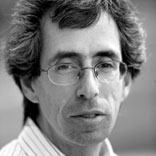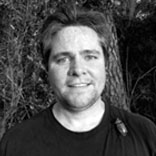 Mathematics called to Fred Adler when he was in kindergarten. “Supposedly—I barely remember this—I would get up earlier than everyone else in the family, and I’d be down at the table working out my little number patterns,” Adler says. His innate interest led him through a mathematics program at Harvard, from which he graduated with a BA in 1984. But he didn’t find the beauty in math that he had been looking for until he began a graduate program in applied mathematics at Cornell. “I had this intuition that mathematics is really about story-telling,” he says. “It’s about taking a description of the world and translating it into something you could work with.” After his first year, Adler volunteered to help field biologists study tree swallows, and mulled over how mathematics could help researchers understand real-life systems. “The realization for me was that if you want to do anything worthwhile, you’ve got to talk to biologists—that’s where I find all my good problems.” After working on mathematical models of plant plagues, ant battles, and infectious-disease spread, to name a few, Adler got his PhD in 1991 and moved to a postdoc position at the University of California, Davis. There he delved into ecology, statistics, and plant and animal behavior, which grew into his current focus on urban ecology, virology, and immunology as a professor at the University of Utah. To learn about his latest mathematical “story” on disease spread, read “Catching the Cold.”
Mathematics called to Fred Adler when he was in kindergarten. “Supposedly—I barely remember this—I would get up earlier than everyone else in the family, and I’d be down at the table working out my little number patterns,” Adler says. His innate interest led him through a mathematics program at Harvard, from which he graduated with a BA in 1984. But he didn’t find the beauty in math that he had been looking for until he began a graduate program in applied mathematics at Cornell. “I had this intuition that mathematics is really about story-telling,” he says. “It’s about taking a description of the world and translating it into something you could work with.” After his first year, Adler volunteered to help field biologists study tree swallows, and mulled over how mathematics could help researchers understand real-life systems. “The realization for me was that if you want to do anything worthwhile, you’ve got to talk to biologists—that’s where I find all my good problems.” After working on mathematical models of plant plagues, ant battles, and infectious-disease spread, to name a few, Adler got his PhD in 1991 and moved to a postdoc position at the University of California, Davis. There he delved into ecology, statistics, and plant and animal behavior, which grew into his current focus on urban ecology, virology, and immunology as a professor at the University of Utah. To learn about his latest mathematical “story” on disease spread, read “Catching the Cold.”
 Aaron James has spent his career delving deep into the murky waters of morality within political philosophy. But inspiration for his latest book, Assholes: A Theory, came to him while atop a clear blue wave in the Pacific Ocean. “I was surfing and there was someone breaking the rules of the right-of-way. I thought to myself, ‘Well, this guy is an asshole,’ ” James remembers. And that surfer’s behavior got him thinking deeply again, this time about what qualities make a person an a-hole. James, a Harvard graduate, surfing enthusiast, and an associate professor of ethics and political philosophy at University of California, Irvine, began having conversations with colleagues about what drives the sense of entitlement that such individuals display. “They’re unfortunately a part of the human condition,” he says. As he constructed his philosophy, he saw connections to bigger issues and moral philosophy—like capitalism and gender—and came up with strategies for how to handle the inevitable a-hole in your life, which he describes in his book and discusses in his essay, “The A@#hole Scientist.”
Aaron James has spent his career delving deep into the murky waters of morality within political philosophy. But inspiration for his latest book, Assholes: A Theory, came to him while atop a clear blue wave in the Pacific Ocean. “I was surfing and there was someone breaking the rules of the right-of-way. I thought to myself, ‘Well, this guy is an asshole,’ ” James remembers. And that surfer’s behavior got him thinking deeply again, this time about what qualities make a person an a-hole. James, a Harvard graduate, surfing enthusiast, and an associate professor of ethics and political philosophy at University of California, Irvine, began having conversations with colleagues about what drives the sense of entitlement that such individuals display. “They’re unfortunately a part of the human condition,” he says. As he constructed his philosophy, he saw connections to bigger issues and moral philosophy—like capitalism and gender—and came up with strategies for how to handle the inevitable a-hole in your life, which he describes in his book and discusses in his essay, “The A@#hole Scientist.”
 Aaron Dossey first combined his two passions—insects and chemistry—in his final year of graduate school in 2006, when the University of Florida, Gainesville, had just bought a new nuclear magnetic resonance probe. Dossey brought in several insect specimens he had been keeping at home, and extracted chemical compounds to test the new device. Although his academic research career had focused on biochemistry, in his spare time he had become a self-taught entomologist. “I think insects are fascinating: they’re neat to look at and there are so many unique life history and biochemical stories,” Dossey says. After a biochemistry postdoc position, also at the University of Florida, he made the full switch to entomology in 2010 as a postdoc with the United States Department of Agriculture (USDA). While studying citrus pests, Dossey became ever more enthralled with the world of insects. Heeding a call for grant applications from the Bill & Melinda Gates Foundation, he turned his attention to making sustainable foods from insects. After winning the grant, Dossey set up his own business, All Things Bugs, and has so far used insect protein to create taco meat, protein bars, and a paste to treat malnutrition. To find out more about how insect-based food can contribute to global food security, read his story “Why Insects Should Be in Your Diet.”
Aaron Dossey first combined his two passions—insects and chemistry—in his final year of graduate school in 2006, when the University of Florida, Gainesville, had just bought a new nuclear magnetic resonance probe. Dossey brought in several insect specimens he had been keeping at home, and extracted chemical compounds to test the new device. Although his academic research career had focused on biochemistry, in his spare time he had become a self-taught entomologist. “I think insects are fascinating: they’re neat to look at and there are so many unique life history and biochemical stories,” Dossey says. After a biochemistry postdoc position, also at the University of Florida, he made the full switch to entomology in 2010 as a postdoc with the United States Department of Agriculture (USDA). While studying citrus pests, Dossey became ever more enthralled with the world of insects. Heeding a call for grant applications from the Bill & Melinda Gates Foundation, he turned his attention to making sustainable foods from insects. After winning the grant, Dossey set up his own business, All Things Bugs, and has so far used insect protein to create taco meat, protein bars, and a paste to treat malnutrition. To find out more about how insect-based food can contribute to global food security, read his story “Why Insects Should Be in Your Diet.”














